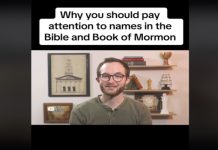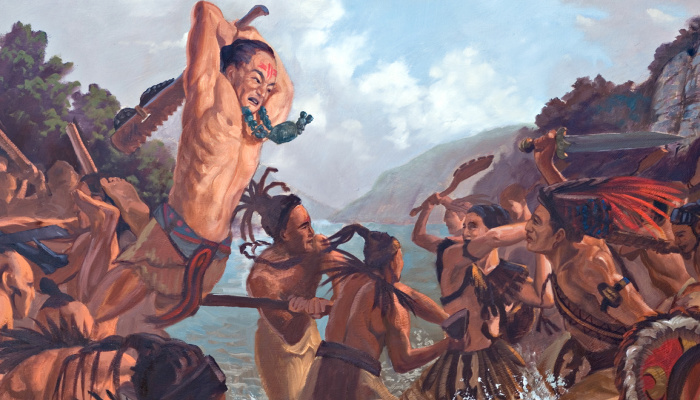
There had been heavy losses on both sides of the battlefield. Many Nephites lay dead in the blood-soaked valley near Manti, their helmets split in half by the ferocious Lamanites. But it wasn’t just Lamanites who raged against the Nephite battalions. Amalekites and Zoramites had joined the Lamanite cause. In fact, it was they, the apostate Nephites, who had incited the Lamanite attack against their former brethren.
But the Nephites had come out on top. Despite fighting “like dragons,” the Lamanites were cornered. The Nephite captain, Lehi, stood with his armies on the East bank of the river Sidon. Another Nephite captain, 25-year-old Moroni stood with his armored ranks on the West side of the river, hedging the remainder of the Lamanites between the two armies.
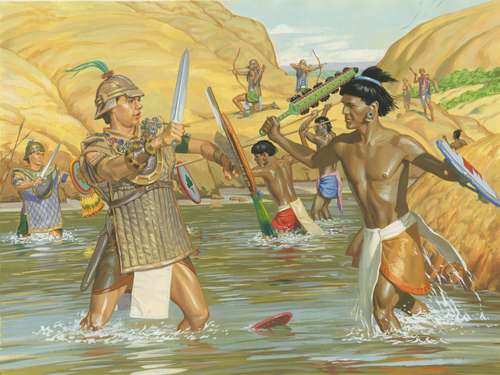
The enemy was surrounded. Among the surviving Lamanites was Zerahemnah, the enemy’s dangerously bold leader. Captain Moroni gave the order to stop fighting. The Nephite soldiers pulled back a few paces. The battle was won. Justice had been served. It was mercy’s turn. Moroni called out to Zerahemnah:
Behold, Zerahemnah, that we do not desire to be men of blood. Ye know that ye are in our hands, yet we do not desire to slay you.
Behold, we have not come out to battle against you that we might shed your blood for power; neither do we desire to bring any one to the yoke of bondage. But this is the very cause for which ye have come against us; yea, and ye are angry with us because of our religion.
But now, ye behold that the Lord is with us; and ye behold that he has delivered you into our hands. And now I would that ye should understand that this is done unto us because of our religion and our faith in Christ. And now ye see that ye cannot destroy this our faith.
Now ye see that this is the true faith of God; yea, ye see that God will support, and keep, and preserve us, so long as we are faithful unto him, and unto our faith, and our religion; and never will the Lord suffer that we shall be destroyed except we should fall into transgression and deny our faith. …
I command you by all the desires which ye have for life, that ye deliver up your weapons of war unto us, and we will seek not your blood, but we will spare your lives, if ye will go your way and come not again to war against us.
A scowling Zerahemnah approached Moroni. He dropped his weapons at Moroni’s feet.
Behold, here are our weapons of war; we will deliver them up unto you, but we will not suffer ourselves to take an oath unto you, which we know that we shall break, and also our children; but take our weapons of war, and suffer that we may depart into the wilderness; otherwise we will retain our swords, and we will perish or conquer.
And then Zerahemnah reveals something about himself that every one of us should remember…
Zerahemnah’s revelation (or lack thereof)
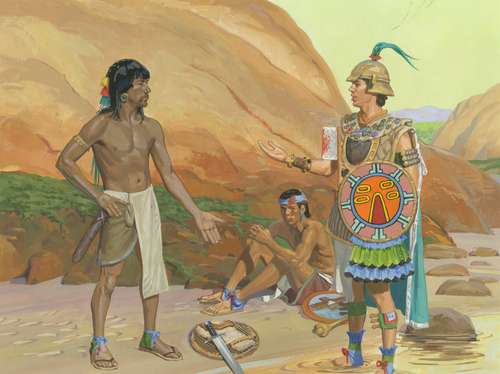
The Lamanite captain seethed towards Moroni,
Behold, we are not of your faith; we do not believe that it is God that has delivered us into your hands; but we believe that it is your cunning that has preserved you from our swords. Behold, it is your breastplates and your shields that have preserved you.
This is where our story stops. If you want to know what ends up happening to the Lamanite army, read the rest of Alma 44. As for us, let’s dive a little deeper into Zerahemnah’s claims.
The Nephites credit God for their victory over the Lamanites, despite being heavily outnumbered. The Lamanites credit the Nephites’ armor for the victory. Who is correct?
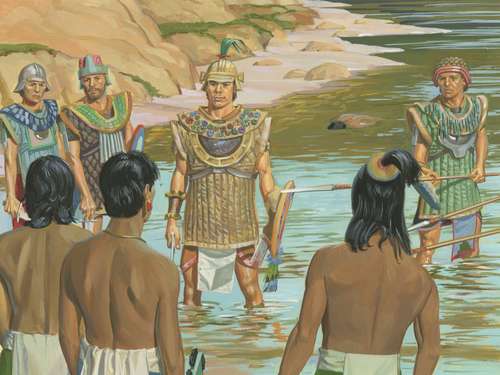
The scriptures clearly want us to believe that God was the author of their salvation, but … the armor did help, right? If it truly had been God’s doing, couldn’t the Nephites have won the battle without the armor? Maybe, but my realistic mind tells me that at the very least, the Nephites would have suffered many more casualties. So where does that leave us?
We grapple with the same kinds of questions
The truth is, in this kind of a “this or that” scenario, the answer is “this because of that.” From a faithful perspective, it’s easy to see that God simply inspired Moroni to prepare his armies with armor, because that’s what they needed in order to conquer on the field of battle. That’s apparent in the scriptures, but we oftentimes face similar questions on our own journey of faith where that answer is harder to see:
Is God going to help me, or should I help myself? God very well might help you to help yourself (oftentimes he’ll send a friend or family member to help you).
When I pray and ask God a question, do I receive an answer from God or was it the result of my thought processes and meditation? Probably both.
Am I healthy because God blesses me for obeying the Word of Wisdom, or because the Word of Wisdom simply leads to a healthy lifestyle? I don’t know that there’s a difference.
Another take on revelation
Revelation is a tough process to nail down. It’s a little different for everybody. Sometimes I think God reveals broad, important truths to us, and then it is up to us to figure out how to apply those truths in our lives. Then, hopefully, God consecrates our efforts for our benefit (or corrects our trajectory). Revelation isn’t always a one-way street from God to us. Sometimes it’s a back and forth cycle.
For example, God could have revealed to Moroni: “Protect your soldiers.” It would then be Moroni’s responsibility to, with as much inspiration as possible, figure out how to implement that revelation. Shields, breastplates, thick clothing, helmets, war strategy. The idea is that God then gives Moroni the thumbs up and pitches in where needed.
So, was Zerahemnah correct? Did God have nothing to do with the Nephite victory? God had everything to do with it. But that’s doesn’t mean Moroni just got to sit back and watch God do all the work. God wants to work with us, not for us. That’s what Zerahemnah couldn’t understand. Let’s not make the same mistake.
Let’s all resolve to do a little better at recognizing God’s hands in our lives. They’re there, right next to our own.





